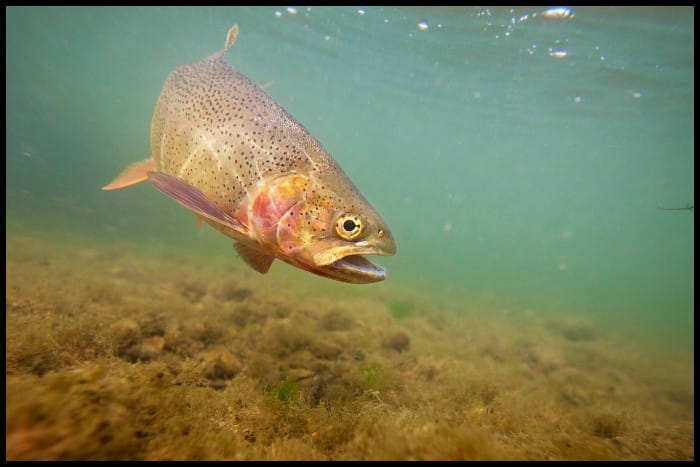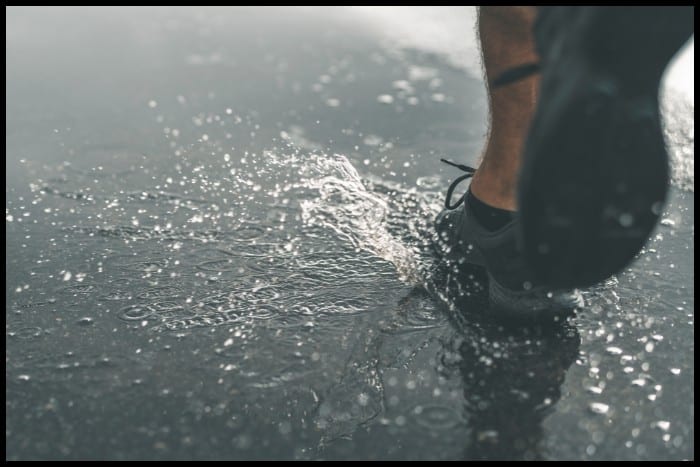Understanding how the fish you’re targeting fight is essential to being a successful angler. All fish have their own fighting tendencies that vary depending on their size, the time of year, and where you’re targeting them. Trout and bass are two of the hardest-fighting freshwater gamefish.
While trout fight extremely hard for their size, bass fight harder. Depending on the gear you use to target these fish, you’ll find that the fighting experience is far different. Trout are often targeted with finesse gear, and bass is targeted with heavier equipment, so that’s important to consider.
Both fish are a blast to fight, and it’s important to understand their tendencies.
What to Expect When Fighting Trout
Pound for pound, trout are a respected fish in their fighting ability. They give anglers fits wherever they’re able to catch one. Regardless of their size, anglers will have a blast going after these fish.
While smaller trout can be a bit more unpredictable when they fight due to their inexperience and lack of size, those hearty, old fish generally have a few things they do when they’re in a fight to shed a hook or escape any sort of predator.
The sooner you can learn this “program,” as many call it, the more success you’ll have fighting those trophies.
There are a couple of things anglers need to be ready for when you hook into one of those trophies.

1. Be Ready for Large Runs
A run is something trout do when they’re looking to escape. It’s when they take off swimming hard up or downstream.
This hard swimming is done because they want to use their speed and get away from the area where they were hooked.
At this point, they’re trying to escape the hook in their mouth, and swimming away hard is a good method.
If trout swim hard downstream, you can land them better. You can turn their head back upstream and use the current in your favor.
The pressure of your line and the current will tire out the trout quickly, and you’ll have a great chance at getting them into your net.
If trout take off upstream, you may be in trouble. A trout big enough to go on a long run upstream is not only large but they’re generally experienced.
The upstream fight is exhausting for the fish, but it puts a significant amount of pressure on your line, causing you to potentially break off.
They’ll run upstream, park themselves in the current and use their power to their advantage. Your job of landing them has become more of a challenge.
It becomes more of a finesse fight since you don’t want to snap, but you also want to do your best to tire them out enough to land them.
2. Be Ready to Fight Trout Out of Cover and Structure
It’s not uncommon for trout of all sizes to immediately try and return to structure and cover as soon as they’re hooked. Cover and structure are safe places for them.
If trout have been caught before, they know that catching the line on sharp rocks, sticks, and vegetation can easily snap it and free the fish.
As anglers, we must do our best to get the fish out of the structure to land it.
The real trouble occurs when we can no longer feel the fish on the end of our line and only feel as if our line is snagged.
Generally, this means the line has wrapped around a stick or rock, and the trout is on the other side but not feeling as much pressure.
Again, it turns into a finesse fight, as getting the fish out of the structure is important before the more aggressive fighting can begin.
Check out my article on the best fishing line for trout to ensure you’re using the right one!

What to Expect When Fighting Bass
Bass are a favorite fish for anglers to catch for various reasons. Bass can grow large, they fight extremely hard, and they have large populations all over the world.
Understanding their tendencies once hooked will give you a higher chance of consistently landing them. When bass are hooked, they immediately become the aggressors.
They aren’t eager to play any games, and they work to get that hook free as quickly as possible. Like trout, bigger bass have a few go-to tendencies when trying to free themselves from your bait.
1. Be Ready for An Immediate Run
Whether a bass has picked off your swim bait or picked your worm up off of the bottom, as soon as they feel something off, they’re gone. Bass will take off hard in one direction when they’re hooked.
They’ll dart in and out of vegetation, around rocks, and do aggressive head shakes to free the hook. They want to use their size and power to their advantage once they feel that pressure.
As long as you keep pressure on them, you should be able to withstand those initial runs.
2. Be Prepared for Leaps
Bass often turn to the air if their initial run doesn’t work. They’ll leap into the air and complete several head shakes to throw your lure.
The air provides little resistance, so they can get a ton of power behind their head shakes. It’s not uncommon to see your lure go flying as soon as a bass leaps into the air.
Bass will leap several times into the air during a fight. If it’s worked for them before, they’ll be especially prone to it.
Keeping your rod tip low makes it more challenging for the bass to jump, so keep that in mind.

3. They’ll Go For Cover and Structure
If the initial hard run and leaps into the air don’t work, they’ll follow a similar pattern to trout. They’ll go deep into a rock pile or logs and try to shake the hooks free.
This method often proves to be extremely effective. They make it hard for anglers to keep as much pressure on them, and it buys them time to complete more headshakes.
Even though the fish is hooked, the structure and cover provide them with a bit more of a sense of security. They don’t feel like any predator will be able to strike while they’re in a vulnerable position.
If you feel the line becomes stuck and there’s no movement at the end, you don’t have many options.
Either the bass will free itself, or you have to work toward the snag in the hope of freeing it and continuing the fight.
Again, my article on the best fishing line for bass will help you find the right one!
Final Thoughts
While bass tend to fight harder than trout, both are high on the list for some of the hardest fighting game fish. Bass and trout are aggressive, crafty, and desperate to free themselves from your hook.
Anglers need to understand that trout and bass will go on long runs, take to the air and eventually find cover in hopes of relieving the tension.
Most bass and trout will fight the same, but some extremely large fish may surprise you. They’ve grown to be that large for a reason, so it’s best to be prepared for anything.
